|
Manufacturing: Making Stuff
Buying U.S. Equipment To Do U.S. Stuff: Spending on capital equipment used to grow at an average of 6% per year, according to an article in American Thinker written by Greg Richards.
For the last 18 years, net capital spending has been flat - zero growth. In 2001, George W. Bush agreed to admit China to the World Trade Organization. "This gave China access to world markets and particularly to the American market. Since our system is heir to the English Common Law tradition, when we sign an agreement, we carry it out. No other culture takes this view, certainly not China. The Chinese have practiced mercantilism after signing the WTO agreement and getting access to our market, while the whole point of the WTO is to keep mercantilism out of world trade." Greg included a graph in his article that is visually dramatic and disheartening.
When 60% of the plastic injection molding companies in Clark County Washington close (because all work has moved outside the U.S.), there's no one to buy injection molding equipment. Most American plastic equipment companies closed their doors. Meanwhile, molding machine manufacturers in Asia prospered, selling machines to Chinese firms who molded items and shipped them to America.
Back in 2002, I wrote, "An article in the Detroit News reports that Michigan's tool and-die and plastic molding businesses are slipping imperceptibly into oblivion. Increasingly, industrial customers are going overseas for tools, dies and molds, not to mention the products made from them. Local shops are closing at an alarming rate. Along some of Metro Detroit's industrial thoroughfares defunct tool shops stand shoulder-to-shoulder. Michigan is believed to have the highest concentration of these businesses in the United States - 1,600 shops employing more than 50,000 workers.
In my early years, as a plastics processing engineer at Rohm and Haas, I visited a lot of these little shops - spread out between southern Michigan, western Ohio and southern Indiana. They supplied things like nameplates, bezels, taillights and dashboard dials to the big automotive companies. Many people don't realize that a lot of these components for domestic cars are now made in Mexico. Complete sub-assemblies are shipped to Detroit for final assembly. Even here in Vancouver, three plastic injection molders have gone out of business in the last year. Their customers went to Mexico or Asia for their molded plastic components. All molded plastic cases for Hewlett Packard’s printers are now made in Mexico. Or Asia. It's sad for me to see - the end of the manufacturing era in the U.S." And this is only about plastics molding. Multiply that by all the other manufacturing which has been offshored - vacuum forming, die casting, steel stamping, aluminum extruding, wire-drawing, CNC machining, etc. and you begin to realize the scope of the problem.
Richards concluded, "What we do in America when we find ourselves in a jam is roll over to the attack. That is what Donald Trump is doing in world trade. Trump is not attacking other countries; he is attacking trade policies pursued by other countries, which are to the detriment of the United States and which we can no longer let lie. Other countries are not used to being called to account by the U.S., so his doing so is an affront to them, is a transgression in polite diplomatic society.
So be it. The time for it has arrived." (posted 8/10/18, permalink)
Everything Seems To Be Made In China: Graphic proof:
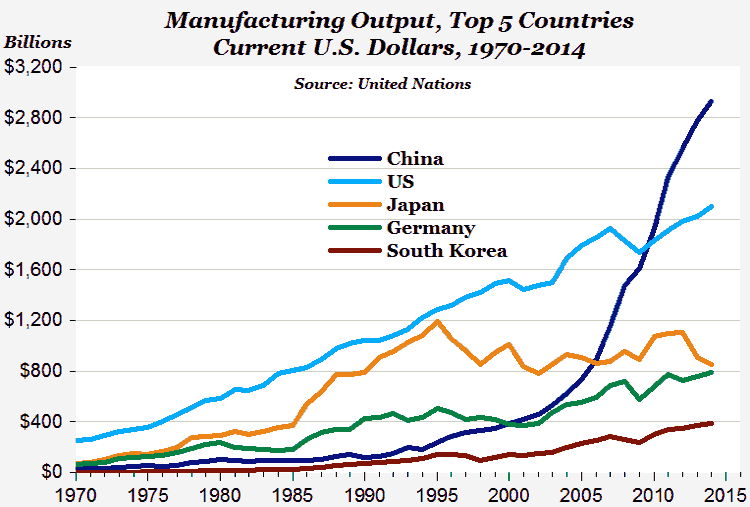
What a frightening graph. If these trends continue ... we're doomed. (posted 2/23/16, permalink)
Why The Chinese Are Winning: My friend and fellow plastic buddy Dennis G. and his wife Sandy presented me with this crystal musical train for Christmas. It makes a great decoration; when a button is pressed various Christmas carols play and the train lights up in time with the music. The lights bounce around all the edges of the crystal-clear styrene plastic molding; the effect is enchanting.
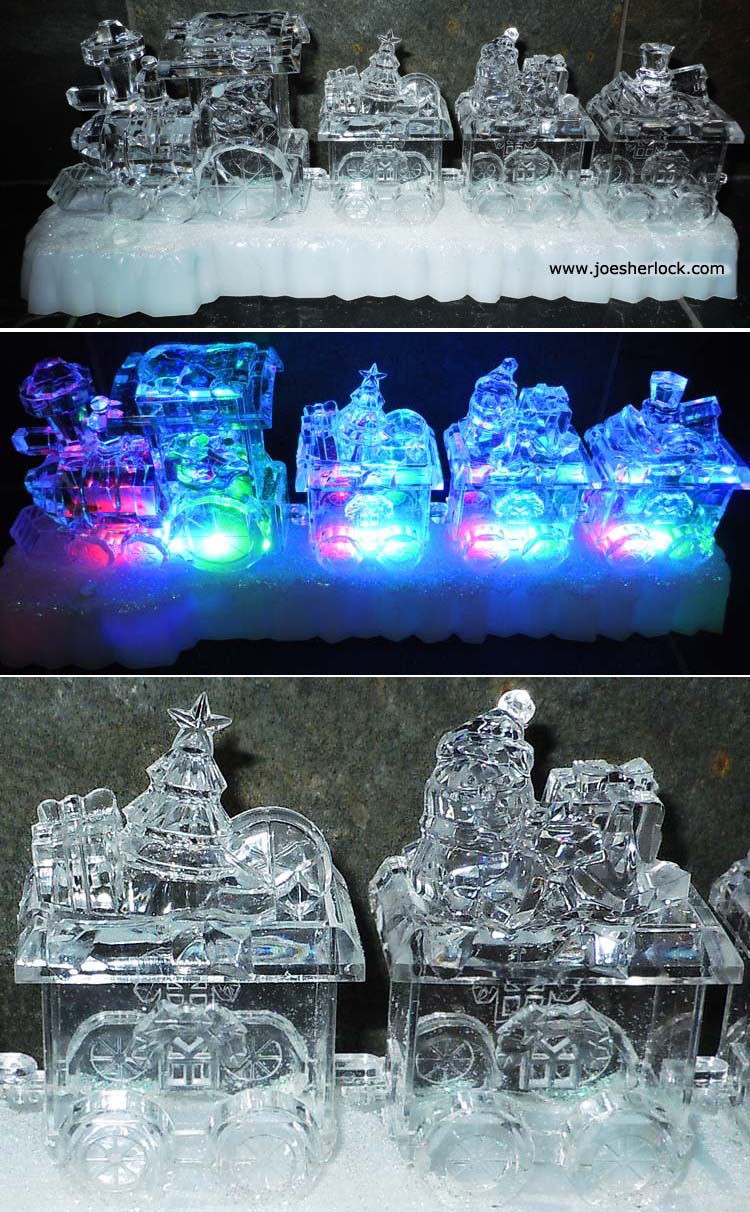
This modestly-priced, 12-inch long item is distributed by Walgreens and manufactured in China. I don't know which company produced this but the injection molding of the crystal polystyrene plastic is first-class. The plastic is as clear and free of inclusions as top-grade Plexiglas. Most Christmas 'junk' contains a high percentage of reground or reprocessed plastic (to save money) with resultant black specks, smears and a yellowish cast. Not here.
The mold is well-constructed and has been polished to a very high level - I'm guessing a three-micron mirror finish - something not often seen, even in America, and unusual for a budget Christmas display.
The Chinese have discovered quality. They realize that good value-added features improve profitability because a higher price can be commanded. If American companies want to compete, they'll have to match or exceed China's ever-improving quality/price matrix. (posted 1/4/16, permalink)
Job Creation - What If? Did you know that President Obama's stimulus program put $1.8 billion into the city of Baltimore's coffers, including $467.1 million to invest in education and $26.5 million for 'crime prevention'? (Seems like that 'crime prevention' money was certainly wasted.)
Everyone claims that the biggest problem in Baltimore - and other urban areas - is a lack of jobs. But none of the politicians seem to be doing anything about it.
With $1.8 billion in federal funds, disbursed of a 15 year period, I believe that I could create over 9,000 new permanent jobs in Baltimore.
Here's my idea: Create a special Enterprise Zone for manufacturers. To qualify, a business must either 1. Relocate to within the zone, or 2. Provide transportation service (airport-style jitney buses, for example) to a location within 30 minutes of the zone.
When unemployed workers from the zone are hired, the employer pays them $2 per hour. The government kicks in $8/hr. for the first 10 years of the program. This provides the employee with a $10 per hour wage. (As of July 15, 2015, Maryland's minimum wage will be $8.25/hr.)
If an employer wants to give an employee a raise, that's fine. The government still kicks in its $8 subsidy.
After ten years, the government subsidy gradually decreases so that by the beginning of year 16, it drops to zero.
 |
Checking quality on on rotating jewelry displays before they leave the manufacturing area at Discovery Plastics in 1985. Display manufacturing is fairly labor intensive and not particularly capital intensive, which is why much of the display business has moved to Asia where labor costs are low.
|
Total cost to create 15 years of employment would be less than $202,000 per employee. It sounds like a lot of money but I would posit that it is much cheaper than other programs. To wit: A Government Accountability Office report released in August, 2010 that the Department of Energy spent more than $1.9 billion in stimulus funds to create 10,018 jobs, an average of $194,213 spent per full-time job created. Most of these were temporary construction jobs - not ones which would provide at least 15 years of employment.
The idea of getting employees for two bucks an hour may entice manufacturing companies to bring work back from outside the U.S., reversing the globalization trend and its ill effects.
Speaking of globalization, I firmly believe that the Trans-Pacific Partnership is a bad deal for America.
Frank Miele wrote, "There will no doubt be a big payday for someone down the road, but in case you missed the news — corporate America doesn't exist any more. What we have now is corporate globalism, and all those new jobs that are being created are just as likely to be going to Mexico, Australia, Chile, Canada, Singapore, Vietnam or one of the other 11 likely partners in the Trans-Pacific Partnership. Indeed, they are more than likely to be going in that direction. What multinational corporations want is cheap labor, and they are much more likely to find that in Vietnam than in America."
This is NAFTA, Asian-style. I remember well that, shortly after NAFTA, the North American Free Trade Agreement, passed, Hewlett-Packard and Sharp Electronics moved all their production south of the border. At least three injection molding firms in the Vancouver WA area shuttered their premises. All were producers of components and case goods for computer printers. Multiply that experience by hundreds of industries across the United States.
Ross Perot was right about "that giant sucking sound." Now it's happening again.
Manufacturing is vital to the economy of the United States because it is a generator of wealth. Taking low-cost raw materials (wood, baking flour, steel) and processing them to produce much more expensive items (furniture, cakes, automobiles) creates profit. This in turn produces prosperity - for individuals, for support businesses (trucking, retailers, installers, etc.) and for a nation. (posted 5/26/15, permalink)
Stylish Chinese Crap: Jack Baruth wrote that the retailer Touch of Modern "stocks a variety of utterly fascinating design-y stuff that, by and large, I don't need and would not actually use were I to purchase it. And when you do order something from them, it usually takes four to six weeks to arrive, just like you were ordering from Sears Roebuck back in 1905. Half of the time, what you get is broken or wrongly sized."
Touch of Modern offered this self-description, "We're a small team that handles every aspect of the process from design, testing to manufacturing."
Jack noted that "you will see a variation of it on the websites for 80% of the enviro-friendly, totes-recycled, hipster-friendly clothing and accessories out there. There's always a call-out to the 'small' or 'focused' so-called 'team'. And you'll often hear quite a bit about the location of their corporate headquarters or their annual retreats. You'll also hear about sustainability or sourcing for the materials."
 When Jack asked ToM's parent, Nomadix, where its expensive $64 towels were made, he received the not surprising answer: China. When Jack asked ToM's parent, Nomadix, where its expensive $64 towels were made, he received the not surprising answer: China.
Mr. Baruth wrote on his blog that "I already knew the answer, as soon as I saw their boast about the 'small team'. Guess what? You can't make towels with a 'small team'. The manufacture of towels is a labor-and-materials-intensive operation that requires a big factory and long supply chains and dozens, if not hundreds, of hands.
When Nomadix brags about their 'small team' and neglects to mention their 'big factory in China', they are telling you a couple of things:
• They're ashamed of making towels in China. As they should be. There are plenty of places to make towels in this country and those places pay fair wages and workers comp benefits and adhere to workplace safety regulations. If the 'small team' doesn't have time to find a place that can do it, they can ask me and I'll suggest a few.
• Their concept of the 'team' doesn't include the factory. It's just the Americans, doing awesome things with their small team, sipping lattes at awareness-enhancing spiritual workshops while the faceless people in China live in a Simpsons-Banksy nightmare. They don't want you to do the numbers and see just how much profit there is in a 'Baja CA' towel from China."
Baruth continued, "I've come to believe that this is an issue of identity and empathy. The gentle people of Nomadix, whether they would admit it or not, don't care much for American proles. ... Better to source from China. You visit a factory once, the faceless inscrutable Chinamen say something comforting, and then you never think about it again. You never think about the conditions under which those people are working, you never think about the fact that you are denying jobs to your neighbors who are in need, you never think about the fact that the outrageous margins on your towels represent an outright theft from the workers who should be involved in their production."
And Jack has stopped buying towels from Touch of Modern.
In the first 3 months of 2015, we have an almost $13 billion trade deficit with our NAFTA 'partner' Mexico - at a rate of over $50 billion annually. Our trade deficit with China is projected to exceed $330 billion dollars. And our chief 'export' to China is used cardboard. For every dollar exported to our new pal, Vietnam, we import over five bucks.
Ports covered by Global Port Tracker handled a record 1.73 million 20-foot equivalent unit containers (TEU) in March 2015, the latest month for which numbers are available. The first half of 2015 is forecast at 8.8 million TEU, an increase of 6% over the same period in 2014.
Hackett Associates founder Ben Hackett says the strong increases in volume are coming as ship owners are launching an excessive number of large new vessels, which could spark a price war on shipping rates. "This upsets the supply/demand balance," Hackett said. "There is not enough demand to justify this level of capacity increase. Expect rates on both coastal services to fall to all-time lows."
Finding a way to rebalance our export/import ratio toward parity should be one of the top priorities for our next president (because the present one - Obama - doesn't give a rat's patootie about America). Doing so will bring back employment and go a long way toward helping lift those Americans at the lowest rungs out of poverty. (posted 5/22/15, permalink)
Book Review: 'Factory Man: How One Furniture Maker Battled Offshoring, Stayed Local - and Helped Save an American Town' by Beth Macy
 This well-written, 450-plus page book is information-packed and tells a great story ... seven stories, actually: This well-written, 450-plus page book is information-packed and tells a great story ... seven stories, actually:
1. The unvarnished history of the Bassett Furniture Company - warts and all, including the various quirks, scandals and peccadilloes of various Bassett family members.
2. The tale of John Bassett III, grandson of the founder and principal character of this book, who was denied his due at the family company and left to build his own furniture manufacturing powerhouse. And later, successfully fought the Asian hardwood furniture invasion.
3. An inside look at the cutthroat furniture business - design, manufacturing, distribution and how things evolved (and devolved) over the past century.
4. The story of globalization and its insidious effects on the hardwood furniture industry which was decimated because of the influx of Asian product, coupled with the strategic missteps of American furniture executives, including the leaders of Bassett Furniture.
5. A peek at the D.C. tariff industry and the high-powered lawyers and bureaucrats who sustain it and profit from it.
6. Compelling and poignant stories of those furniture factory workers who struggled for relatively low wages and ultimately lost their jobs as manufacturing shifted to Asia. Without another place to work in the area, they were forced to move away or live at a subsistence level on welfare and odd jobs. Then there's the effect on the communities and the culture and infrastructure of various factory towns, especially Bassett, Virginia.
7. Tales of How Things Are Done in the South, including humorous catchphrases and a look at regional traditions and prejudices.
This book is about companies and people who make stuff. Manufacturing is vital to the economy of the United States because it is a generator of wealth. Ha-Joon Chang of Cambridge University has written that "production is the ultimate foundation of any economy." Taking low-cost raw materials (wood, baking flour, steel) and processing them to produce much more expensive items (furniture, cakes, automobiles) creates profit. This in turn produces prosperity - for individuals and for a nation.
Furthermore, if the nation's products are unique and interesting enough that ... (more >>>)
Inflated Bentley: This Bentley Type R Continental with body by Carrosserie Franay, a French coachbuilder was modeled by Yat Ming, a diecast firm located in Dong Guan, China. The little Bentley is metallic gray with a tan interior. I received it as a Christmas gift.
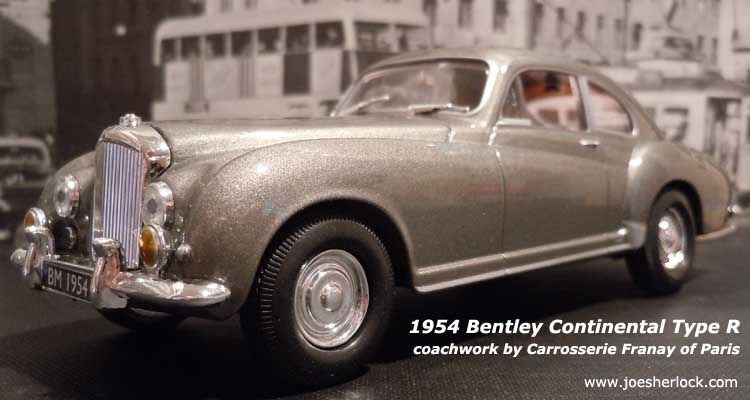
Yat Ming used to make relatively low cost model automobiles - five years ago, all of their 1:43 offerings were priced at under $5. In 2009, prices had risen to around $7. This new Bentley cost $14.95, an indication of price inflation seen recently in Chinese-made goods. (Although the Bentley is still good value for the money.)
Last year and earlier this year, Ixo 1:43 scale Museum Models could be bought new for less than $30. The latest ones are priced at $36.95 - a jump of over 23% in less than a year. Such price jumps are occurring throughout China's manufacturing sector and explains why some production of goods is beginning to move back to the U.S. (posted 1/9/12, permalink)
Survival Skills: Gregory Sullivan at Sippican Cottage has written, "Many people with skinny glasses instead of safety glasses talk a good game. They grow cucumbers in a window box and put together an IKEA shelf and then start blogging about how they've returned to their pioneer roots."
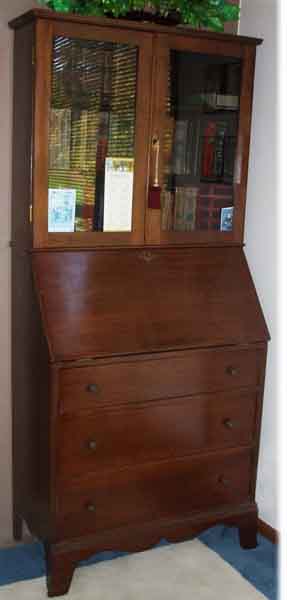 In other words, filling a diaper is not a reason to proclaim: "Look, I just made something." In other words, filling a diaper is not a reason to proclaim: "Look, I just made something."
Then Mr. Sullivan discussed Norm, late of the TV show, 'The New Yankee Workshop': "Norm Abram is the penultimate example of true "Reality TV." He made real things, and encouraged others to do so. No pretense. Not a scam. The balloon boy's father will get his 15 minutes, but being part of Katie Couric's nightly geeks and freaks sideshow act is a virtual reality, not real real. He'll get a book deal or an ankle bracelet or both, but he literally contributes nothing to the sum total of world's worth."
Norm created real objects from scratch. Or repaired them. Or modified them. Or saved them from the Great Trash Heap. There is a great satisfaction in that. I didn't learn proper woodworking until I was in my late 30s.
My aunt had a mahogany drop-front secretary desk-bookcase, topped with a carved crown Chippendale-style bonnet. At age 25, I ended up with it. As was the style at the time (1968), I threw away the crown (deemed 'too fussy' by me) and slathered some hideous green antiquing stain-glop over the tired and marred finish.
By the early 1980s, I became sufficiently ashamed and embarrassed over my sacrilegious act that I set out to restore what remained of the piece. I stripped off the appalling green coating as well as many years of darkened varnish. I repaired and patched the underlying wood where necessary. I removed and refinished all the brass knobs, hinges and trim, replacing what was missing.
I spent many evenings sanding and steel-wooling the solid wood surfaces until they were silk-smooth. Then I carefully applied stain, worked it in with OOOO steel wool and reapplied more stain, working that in - repeating the process until the depth of grain of this fine wood specimen could be fully appreciated. Afterwards, I gently breathed a coat of protective urethane varnish over it. Then it was time to reassemble and realign all pieces. As a final touch, I reglazed the doors with bronze-tinted transparent Plexiglas panels.
I think my aunt would have liked the result. This piece of furniture, made in the mid-1930s, will outlive me. And, with a little TLC, my children too.
Gregory Sullivan commented on the silliness of Reality TV "accomplishments", noting, "Cubicle-bound endomorphs think a contest that looks like figuring out a subway map, a bus schedule, and an airport tote board is an 'Amazing Race'. Catching a trolley is not a bloodsport, no matter how heavy your backpack full of energy bars is."
For many, there is little sense of fulfillment because a great number of people today lack practical manual skills. They're not taught such things in school - no room in the curriculum after packing in all those diversity sessions, conflict resolution workshops and self-esteem courses. Few teenagers are able to land summer jobs where manual work (and craftsmanship) is practiced. The kind of summer job where you come home tired and sweaty - and must immediately jump in the shower to wash away your own stink - is disappearing.
I hope this nation never has to go into survivalist mode. Too many citizens - possessing neither practical skills, common sense nor calluses - won't make it. (posted 11/4/09, permalink)
When Manufacturing Departs: Karl Denninger has written, "We ask "where did the credit go" repeatedly as consumer leverage has risen but personal consumption has risen at a slower rate. There is in fact no mystery: production was offshored to China, India and Vietnam (among others) and replaced with lower-wage "service" jobs. We have used credit as a means of masking our falling real standard of living by engaging in serial Ponzi Finance - first with the Internet Bubble and now with the Housing Bubble. But the Internet Bubble was small potatoes compared to the Housing Bubble, and we've run out of "bigger bubbles" we can blow to take the Housing Bubble's place.
As defaults mount the facts are exposed whether we want them to be or not: our earnings power has been severely damaged as a whole by the intentional off-shoring of high-quality jobs and the importation of lower-quality (and lower-wage) workers into the US and we have tried to make up for the deficiency through borrowing. But borrowed money has to be paid back - and we can't make the payments." (posted 9/30/09, permalink)
In Praise Of Doing Something Real: Matthew B. Crawford, author of 'Shop Class as Soulcraft: An Inquiry Into the Value of Work', has written, "High-school shop-class programs were widely dismantled in the 1990s as educators prepared students to become 'knowledge workers'. The imperative of the last 20 years to round up every warm body and send it to college, then to the cubicle, was tied to a vision of the future in which we somehow take leave of material reality and glide about in a pure information economy. This has not come to pass. To begin with, such work often feels more enervating than gliding. More fundamentally, now as ever, somebody has to actually do things: fix our cars, unclog our toilets, build our houses."

• College was a good idea until everyone started matriculating. Universities have dumbed-down their educational programs ("Don't Flunk The Customer!") to the point where a sheepskin is meaningless. Too many college grads are morons. Employers know this and discount the value of a degree to the point where the cost of a BA - even from a low-cost state institution - will often never pay off.
• People in skilled trades - electricians, plumbers, cabinetmakers, machinists, etc. - now make far better wages than many college grads.
• Most of the unhappy people I've met are college graduates. My theory is that they were fed high expectations at the university (You're special!) which have been largely unmet in the workplace. (No, you're not.)
• I've met very few depressed carpenters. Why? Because there is something especially fulfilling about creating with your hands. Something physical - more than just a CAD rendering. Getting paid good money for it helps with that happiness thing - someone 'values' your accomplishment.
• While most cars, toasters and other appliances can no longer be repaired at home, there are still opportunities for manual creativity, whether it be modification of ordinary devices, making furniture or building a model train layout.
My advice: Learn a skill. Give your hands something to do. Someday, you may be able to make a living from it. And your creations may very well outlive you, providing joy and fascination for generations yet unborn.
Something which will never happen with, say, data entry. Or diversity consulting. (posted 6/12/09, permalink)
Crisis In The Making: Manufacturing is vital to the economy of the United States because it is a generator of wealth. Taking low-cost raw materials (wood, baking flour, steel) and processing them to produce much more expensive items (furniture, cakes, automobiles) creates profit. This in turn produces prosperity - for individuals and for a nation.
Furthermore, if the nation's products are unique and interesting enough that people in other countries want to buy them, fresh capital is brought into the United States. Such capital can used to expand capacity, improve product offerings and increase efficiency - these things make our wares even more competitive and attractive in the world market.
In an earlier posting, I provided specific examples of how U.S. manufacturing has changed and declined over the last 50+ years.
A recent news item in the Columbian (Vancouver, WA) noted, "At least 900 jobs have been lost in the local manufacturing sector in the 12 months through April at a pace nearly six-times the overall rate of job erosion."
"One hundred jobs were cut in computer and electronic product-making just last month. At last count there were just 12,800 manufacturing jobs left here. That’s down 5,300 since April 2001, representing hundreds of millions of dollars in lost wages and benefits to this community."
Bob Baugh, executive director of the AFL-CIO Industrial Union Council said that, in the past five years, the U.S. has lost 5.2 million manufacturing jobs - down from 17.9 million to 12.7 million. Of 5.2 million jobs lost, 800,000 were held by engineers and scientists - people critical to innovation and new product development.
"It really bothers me to see wind turbines made in Denmark being shipped up the Columbia River past aluminum plants that closed because of the Enron energy crisis," Baugh said. "Manufacturing in the U.S. can not be relegated to the dust bin."
Baugh warned, "Our time is up ... we are a country without a strategy when it comes to manufacturing, to trade policy, health care reform and energy production. It’s all connected. Shame on us for not having a strategy to build our manufacturing base, our export base." (posted 6/3/09, permalink)
The Producers: When I was in grade school - in the days when dinosaurs roamed the earth and cars didn't have tailfins yet, one of the subjects we learned was Geography. Much reading and memorization were required. Test questions involved not just physical dimensions: "How large is Ohio?" (Answer: 41,328 square miles) but also what was made there: "What are the chief products of Bolivia?"

In the early 1950s, Bolivia's 412,777 square miles of landlocked, mountainous terrain produced mainly bark, hides, potatoes, cacao, tin and silver. As a third-grader, I didn't fully appreciate the nuances of the goods produced but it was obvious that most of the really backward countries listed sisal and hemp as their chief products. I realized much later in life that perhaps these countries were backward because the populace spent too much smoking all that hemp instead of trying to build a stronger, more prosperous nation.
Even to my elementary school brain, it was apparent that a country must have desirable products which can be sold to other countries in order to become a major player on the world's stage. Most of these products were 'high value added': large trucks, mighty locomotives, massive extruders, huge rolling mills, etc.
America progressed from a dependent colony to a powerful independent nation because it took advantage of the Industrial Revolution and became self-sufficient. This land not only grew its own cotton; it added value by having all those 19th Century New England mills turn it into yarn and cloth. Which was turned into even higher value finished apparel in places like New York's Garment District.
In the early 20th Century - during the heyday of the trolley, J.G. Brill Co. of Philadelphia manufactured streetcars, exporting them to such locations as England, Norway, India, South Africa, Finland, Australia, New Zealand, Japan, the Philippines, Chile, Peru, Venezuela and Egypt.
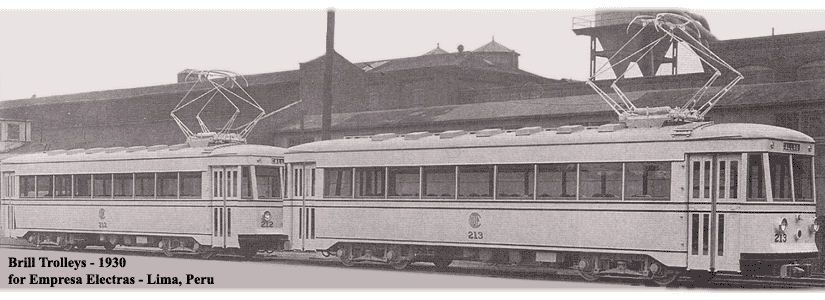
In 1953, more locomotives and rail cars were produced in Pennsylvania than anywhere else on earth. The Keystone State led all others in coal production; anthracite was hauled to major distribution centers along the Pennsylvania Railroad's gigantic, magnificent Horseshoe Curve in Altoona. The Pennsy was once the largest railroad in the world, carrying raw materials and manufactured goods to distribution centers for U.S. consumption and to port cities for export.
In the 1950s, iron and steel were the biggest industries in the state (Pennsylvania was the nation's largest producer of pig iron), followed by industrial and electrical machinery (think of Westinghouse making all those electrical transformers used worldwide). Also mentioned were shipbuilding, hatmaking, textiles and the brewing of beer.
Today, Pennsylvania's largest employer is Wal-Mart, followed by the U.S. Postal Service, the City of Philadelphia and the School District of Philadelphia. Shocking.
In the past 40 years, total U.S. nonfarm employment has increased by 88% (75,500,000 to 142,099,000). During the same period, manufacturing employment has declined by 40% (20,200,000 to 13,388,000). In 1969 over one-quarter of our nation's workforce were employed in factories. By 1990, the figure had declined to 16.2%. In 2009, it's 9.0%. Total manufacturing employment has fallen by more than three million jobs since September 2001.
In 2008, the top four U.S. manufacturers were (according to Industry Week): Exxon-Mobil (petroleum products), Chevron (petroleum products), ConocoPhillips (petroleum products), General Motors (automobiles). All of the oil companies are highly-automated converters of raw commodity materials, rather than manufacturers of high value-added goods.
General Motors vehicles contain lower domestically-produced content every year; many of its offerings are maunfactured outside the U.S. (Mexico, Canada, Korea, etc.) and components are made by low-cost producers in Asia. The engine of the Chevrolet Equinox is made in China; only 55% of its content comes from the United States and Canada. The Equinox is assembled in Canada.
Once upon a time, the U.S. exported everything from die casting machinery, earthmovers, agricultural equipment and, yes, trolley cars. All were high value-added products manufactured entirely here, bringing in new currency to the U.S.
Today, much of America's exported product is waste paper - shipped to Asia to be converted to shipping boxes for manufactured goods for export back to the United States. America's largest exporter, in terms of volume via container, is American Chung Nam, Inc. In a year, the Chinese company typically exports over 200,000 containers of waste paper to its Chinese sister company, Nine Dragons Paper Industries. Weyerhaeuser was the country's second largest export company, with 165,800 containers filled with mostly waste paper.
A Department of Commerce report, 'Manufacturing In America', stated: "American manufacturers are a cornerstone of the American economy and embody the best in American values. They enhance U.S. competitiveness while improving lives domestically and internationally. ... Manufacturers are full partners in the effort to build the future of the country in the marketplace for new products and ideas. Simply put, a healthy manufacturing sector is key to better jobs, fostering innovation, rising productivity, and higher standards of living in the United States."
The report also notes that "manufacturing is crucial to the U.S. economy. Every individual and industry depends on manufactured goods. In addition, innovations and productivity gains in the manufacturing sector provide benefits far beyond the products themselves. There is no dispute over the significant contribution that manufacturing makes to the U.S. economy and to America’s standard of living."
The U.S. needs to foster manufacturing within its borders. I propose four changes:
• Tort reform: The litigious atmosphere in the U.S. puts manufacturers at a competitive disadvantage with the rest of the world and tempts businesses to make or buy in other countries where costs are lower. Product liability insurance costs, health care costs (premiums are high due to malpractice insurance and litigation) and general liability costs are a crippling burden on manufacturers. Manufacturers have become outsized targets, as plaintiffs' lawyers consider operating companies' "deep pockets" of insurance and capital.
'Loser pays' legislation would stop frivolous lawsuits and drastically reduce insurance costs. (You want to lower health care costs? Start here. Such a law would probably cut your office visit bill by half. Or more.)
• Silly, thoughtless state and federal mandates should be rescinded. OSHA personnel should focus on truly dangerous situations, not harassing small manufacturers by counting up blankets and salt pills.
• The U.S. Small Business Administration should be revamped, eliminating useless programs and doing better things with your tax dollars - like encouraging value-added business development.
• We should copy the Chinese and Japanese, doing everything possible to keep the dollar low in value relative to other currencies, so that our exports are attractive and imports less so.
Nigel Gault, chief U.S. economist for IHS Global Insight has said, "The age of the U.S. and world economy being driven by the U.S. consumer may be in the past. We need to become more of a nation of producers rather than a nation of consumers."
Sometimes, it seems like the chief products of the United States are now movies, porn and lawsuits. We need to change that. It's not suitable for inclusion in our geography books. (posted 2/20/09, permalink)
Time Flies: My wife has been repairing old photo albums; many of the snapshots have come loose over the years. These old photos have brought back a lot of memories. It's hard to believe that 30 years ago, we were just taking delivery of a large vacuum forming machine - our plastic company's first major equipment purchase. We had to rent a crane to lift it off the semi.
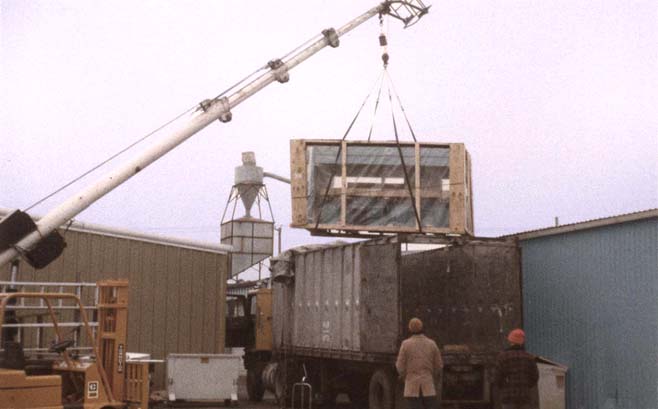
The tall fellow in the tan coat and brown knit cap is my business partner, John Koegler. The equipment had traveled across the U.S. from North Carolina to Oregon in 1978, arriving on a cold, foggy late-Fall morning.
For many years, small companies have recorded major events like these for posterity; photos are saved in company photo albums or stored at owners' homes. The vacuum-forming machine was American made. When a company's manufacturing moves outside the U.S., not only are jobs lost at that particular manufacturer but, in most cases, jobs are lost at large equipment manufacturers as well. Most Asian product manufacture is done with Asian-made machinery.
Photos of the assembled machine and some of the products we made on it can be found here. And here. (posted 11/19/08, permalink)
The Nature Of The U.S. Economy is changing. Ever-increasing productivity means fewer new jobs created. More work is done with less labor. This is a result of technology and is out of a president's control. Any president. Corporations are amoral - they do what's good for themselves (and, hopefully, their shareholders). They worry little about social policy.
Corporations readily relocate work to other locations - including overseas - whenever substantial savings can be achieved. For over 50 years, manufacturing work has been moved from high-cost locations to lower cost ones (from the Northeast to the South in the 1950s, to Japan in the 1960s, to Southeast Asia in the '80s and, now, to China).
The advent of low-cost telecommunications and the ability to send files electronically is now causing high-paying American white-collar, non-manufacturing jobs to move to lower-cost locales such as India. This trend will continue. (posted 10/29/04, permalink)
Other Pages Of Interest
copyright 2009-21 - Joseph M. Sherlock - All applicable rights reserved
Disclaimer
The facts presented on this website are based on my best guesses and my substantially faulty geezer memory. The opinions expressed herein are strictly those of the author and are protected by the U.S. Constitution. Probably.
Spelling, punctuation and syntax errors are cheerfully repaired when I find them; grudgingly fixed when you do.
If I have slandered any brands of automobiles, either expressly or inadvertently, they're most likely crap cars and deserve it. Automobile manufacturers should be aware that they always have the option of giving me free cars to try and change my mind.
If I have slandered any people or corporations, either expressly or inadvertently, they should buy me strong drinks (and an expensive meal) and try to prove to me that they're not the jerks I've portrayed them to be. If you're buying, I'm willing to listen.
Don't be shy - try a bribe. It might help.
|

